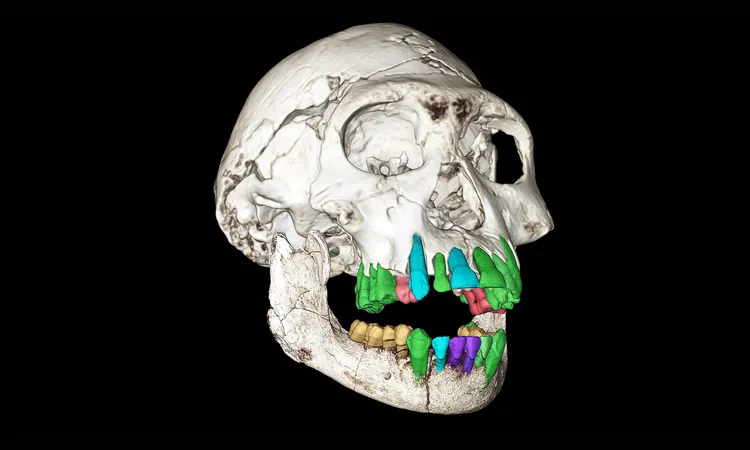
Fossil Tooth Discovery Unlocks Secrets of Human Development and Long Childhoods
2025-03-23
Author: Rajesh
Introduction
Recent findings from ancient fossils have unveiled intriguing new insights into why humans undergo such prolonged childhoods compared to other primates. This extended maturation period has long been understood as a vital phase for acquiring social skills and adapting to complex environments.
Traditionally, scientists attributed the lengthy growth period primarily to the significant energy requirements of developing brains. However, a remarkable discovery at the Dmanisi archaeological site in Georgia, which dates back roughly 1.77 million years, suggests a deeper relationship between cultural learning and the duration of childhood.
Research led by Christoph Zollikofer from the University of Zurich reveals that this fossil of an early Homo individual highlights alternate explanations for our extended youth. The findings challenge the classic notion of 'big brain equals long childhood,' suggesting that prolonged upbringing might have contributed to cultural evolution itself.
Unveiling the Past through Dental Analysis
In an innovative research approach, scientists utilized synchrotron imaging to scrutinize the dental microstructures of the fossilized teeth. Zollikofer explains, 'Teeth are ideal for this study because they preserve well and exhibit growth patterns similar to tree rings, recording our developmental phases.'
Through detailed imaging techniques, researchers deciphered the growth stages of the individual, aligning dental development with the broader growth of the body and brain. This meticulous investigation has benefited from nearly two decades of research, with noteworthy advancements in technology enabling high-resolution scans that preserve the integrity of these ancient specimens.
Unexpected Discoveries in Dental Development
Contrary to expectations, the data revealed a pattern of dental development that straddles the line between early hominids and modern humans. Paul Tafforeau, co-researcher, noted, 'Finding rapid growth in molar crowns unlike anything seen before was astonishing. It indicates a distinctly different maturation process,' leading to the hypothesis that previous classifications might need reevaluation.
The team also discovered that the individual, who lived until approximately 11 to 12 years old, had already developed wisdom teeth, a trait characteristic of great apes at that age. This suggests that humans might have undergone a slower developmental trajectory while still maintaining advanced cognitive capacities.
The Role of Extended Childhood in Human Evolution
Significantly, other evidence suggests that young Homo individuals relied heavily on adult support for extended periods. 'This implies that their milk teeth were retained longer than those of great apes, indicating deeper dependency on caregivers,' stated co-author Marcia Ponce de León.
Moreover, one skeleton among the Dmanisi finds belonged to an older individual who survived despite being toothless, highlighting the importance of communal caregiving. David Lordkipanidze from the National Museum of Georgia remarked, 'The survival of such an older individual suggests a strong, supportive social network.'
These findings emphasize the possibility that intergenerational knowledge sharing—in areas like food processing and tool-making—was crucial for early humans. The interplay between aging caregivers and younger members likely fostered the cultural transmission that forms the backbone of human society.
Reexamining the Foundations of Childhood and Brain Growth
This emerging perspective suggests that rather than large brains necessitating prolonged childhood, it might have been the extended upbringing that propelled cultural growth, subsequently facilitating brain expansion. As knowledge became more extensive, evolution may have favored increased brain size alongside a delay in reaching adulthood.
By revealing how crucial social networks are during early development, these findings spotlight the significant role that extended childhood may have played in shaping modern Homo sapiens. Researchers are now reevaluating assumptions surrounding human growth and development, urging further inquiry into childhood’s profound influence on the trajectory of human evolution.
This groundbreaking study was published in the journal Nature, indicating the fascinating interplay of physical growth, social reliance, and cultural development, which continues to illuminate our understanding of what it means to be human.


 Brasil (PT)
Brasil (PT)
 Canada (EN)
Canada (EN)
 Chile (ES)
Chile (ES)
 Česko (CS)
Česko (CS)
 대한민국 (KO)
대한민국 (KO)
 España (ES)
España (ES)
 France (FR)
France (FR)
 Hong Kong (EN)
Hong Kong (EN)
 Italia (IT)
Italia (IT)
 日本 (JA)
日本 (JA)
 Magyarország (HU)
Magyarország (HU)
 Norge (NO)
Norge (NO)
 Polska (PL)
Polska (PL)
 Schweiz (DE)
Schweiz (DE)
 Singapore (EN)
Singapore (EN)
 Sverige (SV)
Sverige (SV)
 Suomi (FI)
Suomi (FI)
 Türkiye (TR)
Türkiye (TR)
 الإمارات العربية المتحدة (AR)
الإمارات العربية المتحدة (AR)